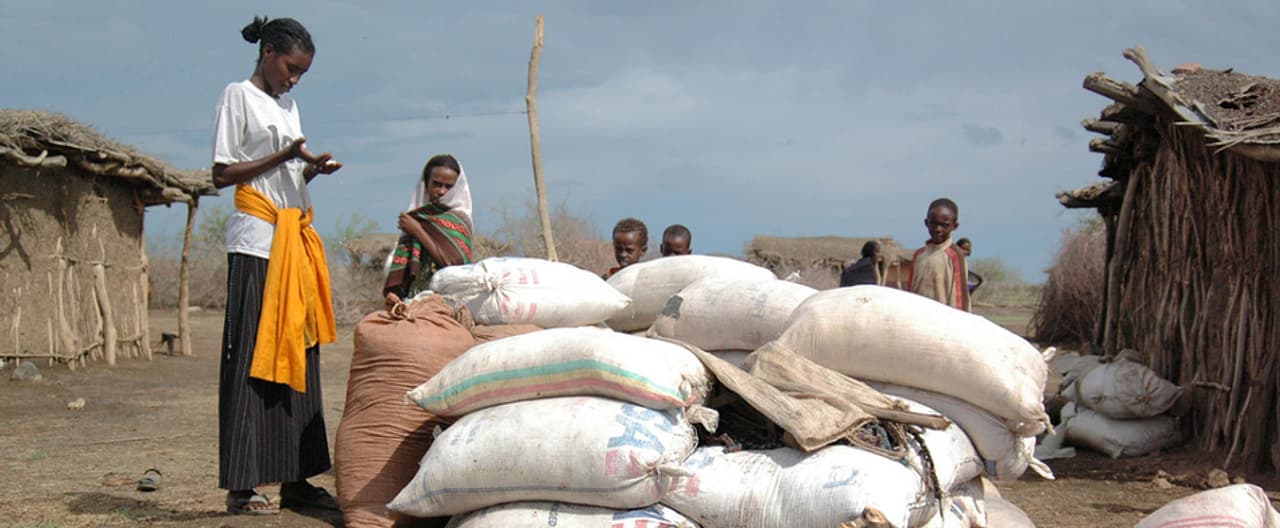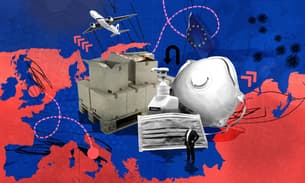
Revealed: Aid to Ethiopia increases despite serious human rights abuses
Britain and the international community stand accused of turning a blind eye to widespread human rights abuses in Ethiopia, by providing billions of dollars of aid despite evidence that it is used as a tool of political oppression.
An undercover investigation by the Bureau and BBC Newsnight reveals that as areas of Ethiopia fall victim to drought and famine, whole communities are being denied basic food, seed and fertilizer for failing to support Prime Minister Meles Zenawi.
The investigation has also gathered evidence of ongoing ethnic cleansing, mass detentions, the widespread use of torture and extra-judicial killings by Ethiopian government forces.
And we can reveal that senior officials in both the EU parliament and the UK failed repeatedly to act on similar reports of horrific human rights abuses.
In one instance the EU Commission allegedly tried to water down an official report, which detailed major concerns about the actions of the Ethiopian government.
Meles Zenawi October 2005 – Flickr/aheavens
Generous donations of aid
Ethiopia receives $3bn in development aid every year, with Britain the second largest donor after the US.
This year the UK will hand out £290m, not including the £48m in emergency aid announced last month, a massive 24-fold increase over the past decade. The EU provided £152m last year.
Yet since 2005, when Zenawi was accused of ‘stealing the election’ after the opposition won a landslide in the capital, evidence of horrific human rights violations have poured into the international community.
Basic human rights abuses are being committed by the Government on a daily basis – the EU must respond firmly and resolutely.
Timothy Clarke
Portuguese MEP Ana Gomes, who was the chief election observer for the European Union during the 2005 Ethiopian election, is outspoken about the ongoing human rights abuses in Ethiopia. She has spoken to the Bureau and accused the international community of a deliberate agenda of ‘hear no evil, see no evil’.
Analysis: How Europe’s taxpayers fund abuses of human rights and democracy
She said: ‘There is this industry of aid not only in the European Commission but in the different member countries, namely those who are the biggest aid donors to Ethiopia, like Britain, like Germany who want the business to continue as usual because they have their own interests at stake.’
Gomes even suggested that EU commission officials attempted to water down reports she produced in 2005 documenting problems with that year’s election. The reports are seen and edited by several people.
‘What really stunned me was the feedback I got from Brussels… the department for development of the commission was completely rewriting my own report and was actually toning down, watering down, all the most difficult passages which were detailing the situation and the repression of the opposition… I was really shocked.’
Reign of terror in Maikelawi detention centre
Turning a blind eye
The problem is that Ethiopia commands a strategically important geographic position.
‘Western leaders resist speaking up against Zenawi’s repressive regime by invoking stability interests. Besides attempting to depict Ethiopia as a success story of development assistance, EU and the US like to portray their ‘aid darling’ as a partner in the fight against terrorism and a crucial actor for stability in the Horn of Africa,’ said Gomes.
The Bureau has been passed confidential daily reports by the former EU Ambassador for Ethiopia, which show abuses were routinely reported to senior officials at the European Commission as far back as 2005.
There is this industry of aid not only in the European Commission but in the different member countries, namely those who are the biggest aid donors to Ethiopia, like Britain, like Germany who want the business to continue as usual because they have their own interests at stake.
Ana Gomez
Violent crackdowns on opposition supporters by Zenawi troops are detailed in 61 emails sent by Ambassador Timothy Clarke to 27 top officials in the highest offices of the European Union.
The emails were sent over three months in the days after the 2005 ballot. They expressed increasing concern about reports of murders and arrests of thousands of civilians by government forces.
Members of the Council of Europe and the Commission’s offices for external relations, development and aid were all contacted.
Related article: Aid as a weapon of political oppression in the Southern Region
On one occasion, on June 12, Clarke became so concerned he demanded immediate action: ‘Basic human rights abuses are being committed by the Government on a daily basis – the EU must respond firmly and resolutely.’
Yet the next day the EU presidency commended the joint Ethiopian declaration on the elections.
Then on July 6 2005 Zenawi, at the invitation of Tony Blair, attended the G8 summit at Gleneagles where they discussed poverty in Africa.
Following the 2005 election, the EU gave €134m to Ethiopia, increasing this to €244m in 2007.
Zenawi’s grip on power
Meles Zenawi came to power after ousting the Derg military regime in 1991, engaging the west under the banner of ‘revolutionary democracy’.
But in the elections of 2005, the opposition won a landslide in the capital Addis Ababa. The government quickly reacted by declaring a victory across the nation. People took to the streets and a brutal crackdown ensued. In the subsequent violence tens of thousands were detained, 193 killed.
Since 2005 Meles Zenawi has tightened his grip on power. In the 2010 elections last year the government secured 99.6% of the vote.
However allegations of mass detentions, oppression, torture and rape continued to surface.
Related Article: EU Ambassador in Ethiopia reported on ‘daily’ intimidation by government forces
Officials informed of abuse
British officials have also repeatedly been told of human rights violations.
Professor Merera Gudina, the founder and leader of one of Ethiopia’s opposition parties said: ‘I’ve been dealing with British diplomats for the last 15 years….. In fact we have challenged your ambassador and diplomats several times especially when they are defending the protection of basic services.
‘A lot of development aid that comes to Ethiopia is misused by the Ethiopian government. We challenge them to monitor where is it going. How the government is using [it]. We gave them the evidence we had and we challenged them to go into the field.’
At no point did the international community publicly condemn Zenawi. In fact on July 6 2005 Zenawi, at the invitation of Tony Blair, attended the G8 summit at Gleneagles where they discussed poverty in Africa.
Reports by the UN, US and human rights organisations have also repeatedly documented abuses by the Ethiopian government.
Gomes said: ‘This is being shown to the international community, there is no way that they can say that they don’t know about these reports. What’s blocking them from acknowledging [what] is going on in Ethiopia?’
Now our investigation can reveal that concerns about aid being used as a political tool are also being ignored.
Ben Rawlence, senior researcher with Human Rights Watch, which has published several damning reports on the situation in Ethiopia said: ‘Development is only available to those people who support the regime or vote for the ruling party.’
This is leaving entire communities without desperately needed aid.
Rawlence added that the international community needed to ‘think much more strategically about how you engage with a country that fundamentally disrespects human rights, how do you make sure that aid in that context actually gets where it’s supposed to get. It’s very, very hard.’
Related article: Voices of the oppressed
Our investigation also reveals that despite the encroaching famine a brutal crackdown by the Ethiopian government is continuing unchecked, forcing thousands to flood out of Ethiopia.
Many are fleeing to Dadaab refugee camp in northern Kenya, which has been in the international spotlight for weeks as thousands of famine victims from Somalia have descended on it.
But unlike the Somalian refugees the Ethiopians who claim to be fleeing hunger and terror are not being heard.
They include a 35-year-old woman who claimed she had lost her unborn baby after being repeatedly raped and stamped on by members of the army; a grandmother of four, arrested along with 100 others from her village, who claimed her son had been slaughtered in front of her; and a man who claimed to have been brutally beaten and made to fight with dogs for food.
Related article: Voices of the tortured
Gomes said: ‘By turning a blind eye to gross human-rights violations, fraudulent elections, impoverishment and dispossession in Ethiopia and on the impact of Ethiopian policies on neighbours, the EU is not only misusing European taxpayers’ money, but supporting an illegitimate status quo, letting down all those who fight for justice and democracy and increasing the potential for conflict in Ethiopia and in Africa.
The Ethiopian Ambassador to the UK Abdirashid Dulane told the Newsnight programme that the report ‘lacked objectivity and evenhandedness.’
He said that Ethiopia ’roundly condemned torture and abuse’ and that there were protections against such acts ‘enshrined in the country’s constitution’. He said that similar allegations in the past had been disproved.
Mr Dulane went on to say that the team in Ethiopia’s only source were ‘opponents of Ethiopia who have already been rejected by the electorate’ accusing the journalists of only gaining evidence from the ONLF and OLF rebels groups and people in the Dadaab camp in Kenya.
The Bureau is happy to clarify that the majority of the interviews were conducted inside Ethiopia.
International Development Minister, Stephen O’Brien, said:
We take all allegations of human rights abuses extremely seriously and raise them immediately with the relevant authorities including the Ethiopian Government, with whom we have a candid relationship. Where there is evidence, we take firm and decisive action.
The British aid programme helps the people of Ethiopia, 30 million of whom live in extreme poverty. We demand full accountability and maximum impact on the ground for support from the British taxpayer.
Watch the full Newsnight report here.
To be kept up to date on this and other stories from the Bureau, please subscribe to our newsletter by clicking here.





